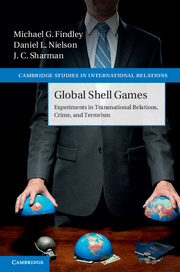Book contents
- Frontmatter
- Dedication
- Contents
- List of Figures
- List of Tables
- Preface
- 1 Introduction
- 2 Explaining the global shell game
- 3 Overall compliance, tax havens, OECD and developing countries
- 4 Terrorism and corruption
- 5 Laws and standards
- 6 Penalties, norms, and US origin
- 7 Conclusion
- Appendices
- References
- Index
7 - Conclusion
Published online by Cambridge University Press: 05 June 2014
- Frontmatter
- Dedication
- Contents
- List of Figures
- List of Tables
- Preface
- 1 Introduction
- 2 Explaining the global shell game
- 3 Overall compliance, tax havens, OECD and developing countries
- 4 Terrorism and corruption
- 5 Laws and standards
- 6 Penalties, norms, and US origin
- 7 Conclusion
- Appendices
- References
- Index
Summary
Serious profit-driven crime depends on some measure of financial secrecy. Shell companies that cannot be traced back to their real owners have become one of the most important means by which criminals obtain this secrecy. Regulating shell companies thus poses a major challenge for many facets of global governance, but it also represents a point of entry from which we demonstrate the utility of a new approach to studying world politics: the experimental science of transnational relations. We premise this new approach on rigorous study of transnational relations and non-state actors through field experiments. Experiments have long been acknowledged as the most powerful way to accurately determine causal relationships. But conventional wisdom has presupposed experiments in international relations to be either impractical or unethical; we hope we have dispelled this myth through the extended example of our Global Shell Games experiments. We provide additional examples of Experimental TR in the pages to follow.
As would-be global governors seek to regulate a wider swath of human activity, the key agents of compliance are increasingly non-state actors such as firms and individuals rather than sovereign states. Global rules may depend on international agreements, but they both shape and are shaped by transnational relations.
- Type
- Chapter
- Information
- Global Shell GamesExperiments in Transnational Relations, Crime, and Terrorism, pp. 168 - 178Publisher: Cambridge University PressPrint publication year: 2014

